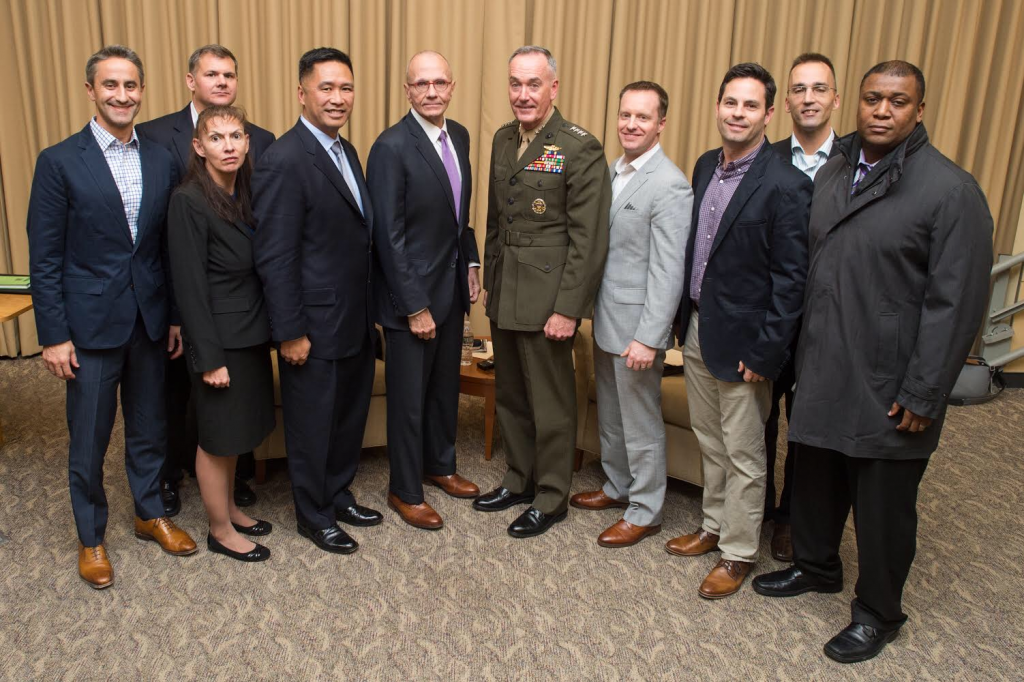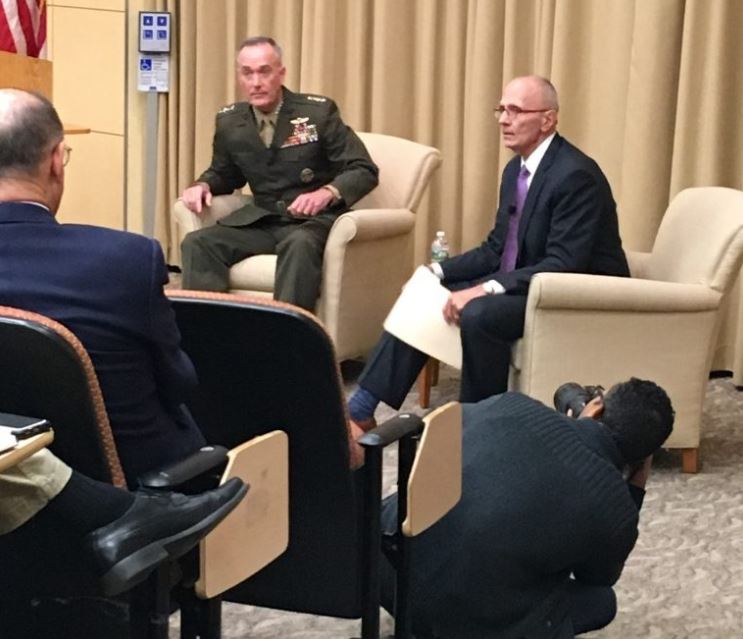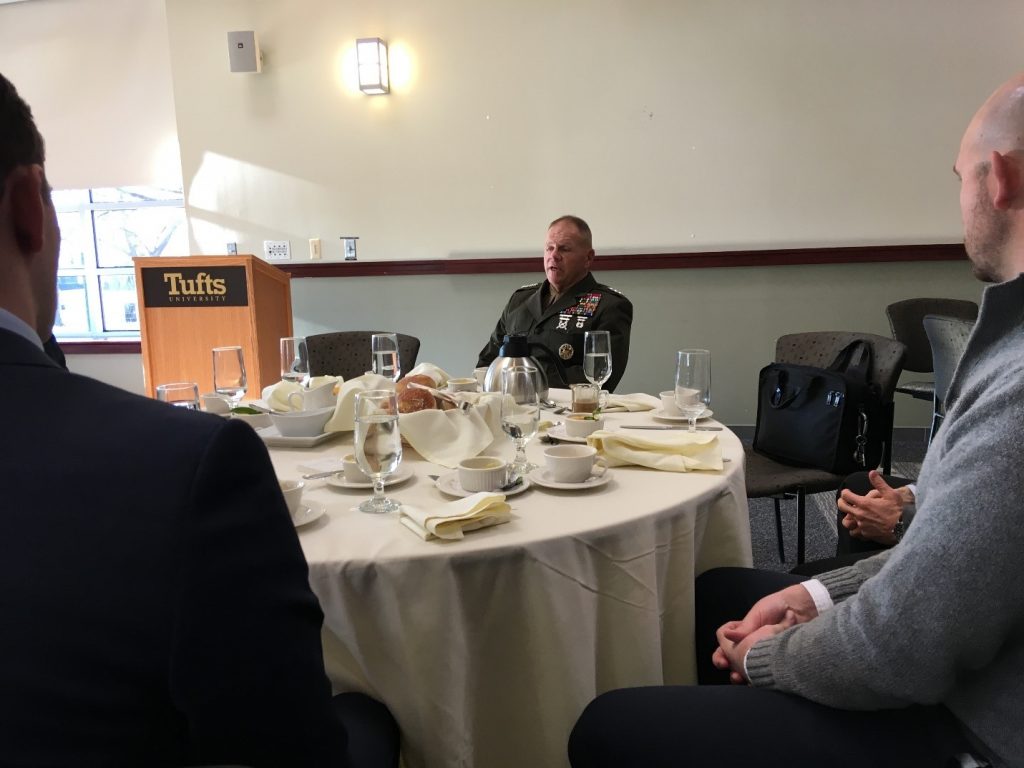Gary’s behind-the-scenes report on Fletcher visitors
Today we’ll hear from Gary, our Student Stories blogger in the PhD program, who will return to the U.S. Marine Corps after he completes his Fletcher studies. Though I’ve often watched as a parade of limousines and police cars escort a dignitary to Fletcher, I had never thought about the behind-the-scenes efforts to make the visit happen, and I’ve learned something from Gary’s post!
One of the great benefits of being a student at Fletcher is the visits of many senior officials and policymakers. This includes not only leaders from the diplomatic, political, and business realms but also senior military leaders. For my service, the U.S. Marine Corps, the fall semester saw a “bumper crop” of such visits. During October and November, the International Security Studies Program (ISSP) hosted the Chairman of the Joint Chiefs of Staff, Fletcher alumnus General Joseph F. Dunford, Jr. (the senior uniformed officer in the entire U.S. Armed Forces); the 37th Commandant of the Marine Corps, General Robert Neller (the senior officer in my service); and Lieutenant General David Berger, the commander of the largest field command in the service, U.S. Marine Corps Forces, Pacific. Between them, these three officers brought more than 120 years of combined service in the Marine Corps to the table. However, I’m not going to talk about what they presented during their visits — in part because two of the lectures took place at ISSP luncheons, which are conducted off-the-record — but instead I’ll take a look “behind the scenes” at what goes into making a visit for one of these senior military officers happen. (The Boston Globe carried an article about General Dunford’s visit here.)


As one might expect, a great deal of coordination typically goes into a visit by a senior leader. Planning begins months in advance. ISSP mails out the official invitations. For last semester’s visits, this step took place before I even arrived on campus in September. After that, suffice it to say that there are a lot of emails exchanged and phone calls placed to work out visit itineraries, menus, locations where people can change from civilian clothes to uniforms or vice versa, and more. Sometimes the group emails a questionnaire with the questions they need answered for their planning process to move forward. If one of the senior officers is arriving via nearby Hanscom Air Force Base, then there are additional considerations involving the base protocol officer, base operations, and so on. If they arrive via Logan Airport, there is a different set of considerations. There is local coordination for security and ground transportation. For an ISSP fellow designated as the AO (“action officer”) for a visit, one of the key things to learn right away is the key contacts on the visitor’s staff — it might be more than one person.
For ISSP military fellows (who spend a year at Fletcher on a non-degree basis), coordinating these visits provides an opportunity to interact with the “brain trusts” behind the senior leaders. Depending on where they are, these groups have different names — Action Group, Staff Group, etc. — but are composed of some of the sharpest young officers in the ranks. For General Neller and General Berger, their teams consisted entirely of Marines, but General Dunford’s staff features officers from across the services and some Department of Defense civilians. These organizations house planners, subject-matter experts, advisors, and speechwriters. In addition to the planning groups, the senior military officers also have aides de camp in charge of coordinating logistics and other general-purpose matters. It can end up being a pretty large retinue of folks when all is said and done — half a dozen people, or more.
After completing their studies, Fletcher graduates in uniform can end up working in these commander’s groups, based on their developed skills in diplomacy and negotiation, oral and written communication, and statecraft. For example, the director of General Berger’s Commander’s Action Group, LtCol Sea Thomas, attended Fletcher immediately upon graduating from the U.S. Naval Academy. (He was a MALD classmate of Fletcher Professor Rocky Weitz!) On General Dunford’s Chairman’s Action Group, LtCol Todd Manyx (ISSP Commandant of the Marine Corps Fellow in 2007-08) serves as a special assistant, and Army COL Abigail Linnington, who holds a Ph.D. from Fletcher (2013), is the director of the organization. From the outside looking in, these groups appear to do meaningful, relevant work directly for senior leaders whose voices count.

It was a great professional honor for me to meet and interact with these three senior Marine Corps leaders. It is not all that often that a mid-grade officer such as me has the chance to meet top leaders. I had served with General Berger previously in Fallujah, Iraq in 2005, so it was great to catch up with him now that he has ascended to near the pinnacle of his profession. During General Dunford’s visit, Professor Hess did me the great honor of providing an introduction to the general, and we spoke briefly, comparing our experiences as Marine Corps fellows at Fletcher. However, the highlight for me was riding with General Neller from the airport to Fletcher, ostensibly as the “on-site lead,” bringing the senior officer up to speed on the “lay of the land” before he steps out of the vehicle and begins the luncheon event. That did happen, but I also had the chance to chat with my service’s top officer about family, hopes for future assignments, and challenges and opportunities for the Corps. That’s not something that happens every day — except maybe at Fletcher!
When high-level visits happen, things can get pretty exciting. You must remain flexible when things change, sometimes even as the visit is already in progress, such as if a flight is delayed and you need to adjust the agenda in real time dynamically. But once the visits end, things return to normal fairly quickly. Then it’s back to classes — until the next visit!